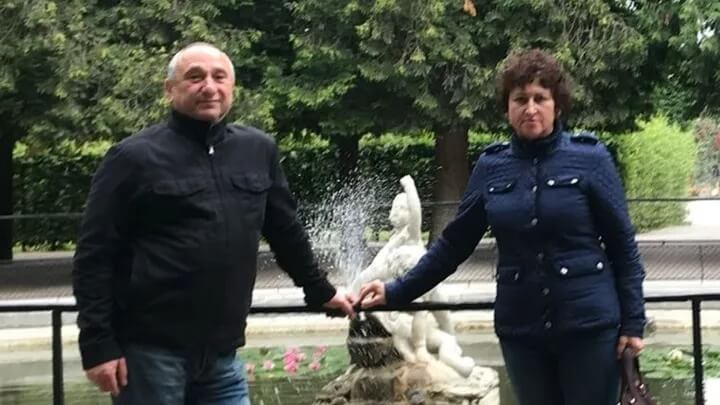Devarim: Confronting Mortality
Last week, I attended the funeral of a member of my former congregation. The funeral fell on a weekend, and we were out with the kids for the day. In the afternoon, my husband Tal and the kids dropped me off at the cemetery, went to the mall for ice cream, and then picked me up. I explained to my kids where I was going, and they were fine with that plan. I didn’t think they thought much of it.
When I put my six-year-old son Jeremy to bed that night, he said: “Mom, I love you so much. Even if you die, I still love you.” I assured him that I loved him too. Then he asked: “Does everyone die, and when you die do you get to come back?” Oy vey, I thought, here goes!
I began by answering as honestly as I could, “Yes, sweetie everyone dies…”
The moment that I said it, I wished I could take it back. Jeremy knew about death — my mother died a year ago — but before that moment, he didn’t know that everyone dies, and by extension that he would die someday. How wonderful that he had lived for six and a half years without this realization. How awful it is to face that knowledge.
In this week’s Torah portion, Moses grapples with the fact that he is going to die without entering the Promised Land. This week’s parasha begins the book of Devarim (Deuteronomy) which is Moses’s final teaching before he dies. The entire book can be understood as his attempt to accept his impending demise. This portion is read on the Sabbath before Tisha B’av (the 9th of Av) which commemorates the destruction of Jerusalem. Therefore, reading about Moses grappling with death coincides with the ritual which confronts our collective mortality.
Even though Moses led the people through the desert for forty long years, he would die without getting to experience his life’s dream of seeing the land. I remember when I learned of this story as a child. We were sitting at a Passover Seder. I was eight or so and I remember being so overwhelmed with sadness for Moses that I almost started to cry right there at the table. I suppose that was the moment that I internalized the idea that everyone dies — and also that one can die even without obtaining one’s life dream.
Now the story of Moses doesn’t seem quite as bad to me. In last week’s parasha, Moses drew up plans for the settlement of the land. What a thrill this must have been for him to make these preparations, knowing they would settle the land because of his life’s work. As parents, dreams shift to focus on the next generation more than our own.
“Most people die when they’re old,” I told Jeremy. I explained that “Big Bubby” his great-grandmother, (my mother’s mother) is 91 years old. “Wow,” he said. I reminded him that we attended her ninetieth birthday. “When she reaches 100, we’ll have to have another big party,” he said, smiled and closed his eyes. I guess when you’re six, 91 seems like a billion light years away, so he felt like death was not something he needed to worry about right now. He snuggled in tighter to the bed.
As I lay beside Jeremy, I realized that I had dodged the second part of his question: “Do you get to come back?” In Judaism, particularly in Kabbalah (Jewish mysticism) there is an idea of gilgul neshamot (cycle of the souls), otherwise known as reincarnation. To be honest, my daughter reminds me so much of my paternal grandmother of blessed memory, for whom she’s named, that I have often wondered whether my grandmother’s soul has returned in her. I once read a book by Rabbi Elie Spitz called “Does the Soul Survive” which persuasively argued that reincarnation does take place. But did I believe in this idea? Did I believe in it enough to tell him definitively: “yes, sweetie, you get to come back,” or more tentatively: “I think you get to come back?”
As a rabbi, these questions are not new to me, but Jeremy’s questioning was different from those I regularly receive from congregants. This was not an intellectual discussion of the various ideas in our tradition. It was a straightforward, yes or no question about how the system of life and death works. He expected a simple, definitive answer.
Since Jeremy seemed comforted with the idea of his great-grandmother’s birthday celebration, I figured I’d leave the reincarnation question alone for now. But I did want to leave him with some hope. I didn’t want to leave him knowing that he would die someday a long time from now, without any further consolation. So, I said, “There is an idea in Judaism that someday God will fix the world and lift up the people, back to life …” Jeremy said, “That’s what my name means: ‘God will lift up the people.’ (On a previous occasion, I had explained to him that his Hebrew name yirmiyah literally means ‘God will lift up’ and that his middle name Yehudah is also the name of the Jewish people.)
“Yes, it sure does,” I said, and kissed him goodnight as he fell asleep.
Rabbi Ilana Grinblat teaches rabbinic literature at the American Jewish University’s Ziegler School of Rabbinic Studies. She lives in Los Angeles with her husband and their two young children.
















